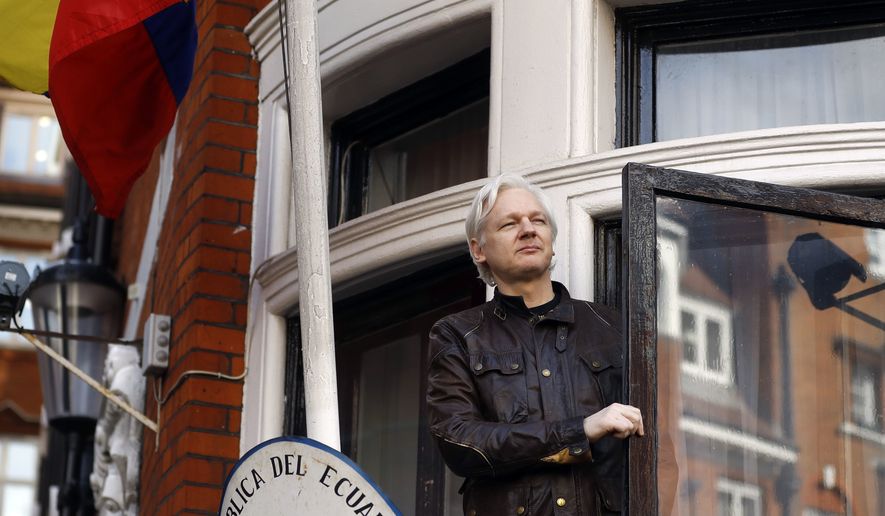WikiLeaks publisher Julian Assange has rejected a bilateral deal that would involve leaving the Ecuadorian Embassy in London after six years and surrendering to British authorities, his lawyer said Thursday.
Ecuadorian President Lenin Moreno told reporters that Mr. Assange should leave the embassy because the U.K. has agreed to “guarantee his life, and guarantee he wouldn’t be extradited to any country where his life would be in danger.”
“The way has been cleared for Mr. Assange to take the decision to leave in near-liberty,” Mr. Moreno added.
Barry Pollack, a lawyer representing Mr. Assange in the U.S., told The Telegraph that the proposal was rejected because it still provided for the possibility of extradition.
“The suggestion that as long as the death penalty is off the table, Mr. Assange need not fear persecution is obviously wrong,” Mr. Pollack said. “No one should have to face criminal charges for publishing truthful information.”
“Since such charges appear to have been brought against Mr. Assange in the United States, Ecuador should continue to provide him asylum,” he told the newspaper.
A 46-year-old Australian native, Mr. Assange entered the Ecuadorian Embassy in London in 2012 while under house arrest in connection with a rape investigation conducted by Swedish prosecutors. He was granted asylum and citizenship from Ecuador in 2012 and 2017, respectively, and prosecutors ended the rape probe last year without filing criminal charges.
Mr. Assange is wanted by British authorities for breaching bail, however, and he fears that he will be arrested upon exiting the embassy and subsequently extradited to the U.S. in relation to WikiLeaks.
“According to the British government, they would never extradite a person to a country where his life is at risk,” Mr. Moreno told CNN on Thursday. “He will spend a few months in jail, after that, freedom.”
Responding on Twitter, WikiLeaks called Mr. Moreno’s prediction of its publisher facing merely a short jail stint “a serious falsehood.”
The U.S. Department of Justice announced in 2010 that it was investigating WikiLeaks after the website started publishing classified diplomatic and military documents, and previous reports have indicated that Mr. Assange risks facing charges including espionage, a potential capital offense.
“The UK is repeating, as it always has, the standard EU policy of asking the US for life in prison instead of death. That’s no deal. Ecuador fabricates the claim to lay the ground for expulsion,” WikiLeaks tweeted.
Lawyers for a group representing journalists’ interests filed a motion in U.S. federal court last month asking a judge to unseal details about the government’s investigation into Mr. Assange after his surname was repeatedly mentioned in a document entered by prosecutors in an unrelated case.
The “fact that Assange has been charged with an unspecified crime or crimes has raised questions about the Government’s potential willingness to pursue charges that may be based on the publication of information— questions that implicate First Amendment concerns, and can only be answered by unsealing the criminal complaint against Assange,” lawyers for the Reporters Committee for Freedom of the Press said in a related filing earlier this week.
The Justice Department said the court filing mentioning Mr. Assange was made in error, and prosecutors have refused to confirm whether he has been charged under seal as previously reported. The case is currently pending in Alexandria, Virginia, before U.S. District Judge Leonie M. Brinkema, a Clinton appointee.
• Andrew Blake can be reached at ablake@washingtontimes.com.




Please read our comment policy before commenting.